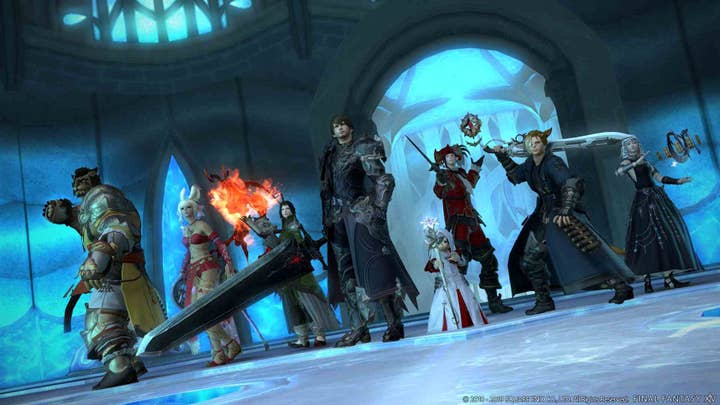FFXIV shows a toxic community isn't an inevitability | Opinion
A bust-up over World of Warcraft's unwelcoming community highlights FFXIV's success: properly enforcing sensible rules
As above, so below. The lawsuit filed against Activision Blizzard by California's Department of Fair Employment and Housing has torn a swathe through Blizzard's senior staff -- albeit a swathe that many former and current company employees feel hasn't been remotely wide or deep enough as yet, and one that's left Activision Blizzard's C-suite suspiciously untouched, leading one to wonder just how many "The Buck Stops Anywhere But Here" desk signs Kotick's band of distinctly un-merry men and women own between them.
At the other end of the spectrum, though, there's been a whole other storm brewing, yet one that's tinged with many of the same issues; at its heart, the question of whether the company with the toxic workplace culture was also running a game with a toxic community culture.
The fact that World of Warcraft has a pretty unpleasant community isn't news, of course; people have been talking about the game's problems with its community for many years, though in recent years perhaps some of the attention paid to WoW's community issues has faded as the game's player numbers have declined and other games -- notably Riot's League of Legends -- have struggled very publicly with their own toxic community issues. In the past few months, though, there appears have been a significant downtick in the relationships between World of Warcraft's players, its streamers, and the company itself -- at the heart of which lies the question of the game's toxic community and accusations of who bears the blame for it.
The stakes aren't just 'people are mad on the Internet'; they're measured in subscriber numbers, revenues and how long WoW remains viable
The specifics of this all make for a weird, messy story that's perhaps best summarised in Ethan Gach's Kotaku article on the matter this week. In brief, however: a popular WoW streamer (with a history of promoting some pretty questionable behaviour during his time in WoW) switched over to playing Final Fantasy XIV on his stream and, totally enamoured of how welcoming and pleasant the community for Square Enix' game is, made some extremely negative comments about WoW's own community and its toxicity.
Things proceeded to kick off when a developer at Blizzard clicked "like" on a tweet suggesting that the streamer in question had himself contributed to WoW's community being so aggressive and toxic; the streamer threw a giant public fit, somewhat proving the point the tweet was making in the first place; and it all pretty much went downhill from there.
It's playground drama, honestly, and nobody involved comes out looking especially good -- not the streamer, not Blizzard, and certainly not any of the crowd of idiots who escalated the whole mess by revealing people's identities and otherwise harassing one another. But while the playground drama itself absolutely isn't worth your attention, the stakes in play behind the whole mess are of some interest.
WoW has had a hell of a run, for sure -- it remains one of the most commercially successful games in history, and its record for subscription revenue will be hard to beat -- but it's now struggling to keep subscribers engaged. Streaming has become a vital piece of the puzzle in terms of marketing and building profile for a game, especially for an online title -- and that means that a very popular streamer getting into a heated public spat over how unpleasant the game's community is (and whose fault that may be) is a problem that will ultimately spill over onto the company's bottom line. The stakes aren't just "people are mad on the Internet", then; they're measured in subscriber numbers and revenues and, ultimately, in some degree of impact upon how long WoW remains viable as a game service.

Underlying the whole argument is a pretty unchallenged but actually quite remarkable fact -- that WoW, coming up on two decades on the market, still hasn't solved problems with in-game abuse, harassment and generally anti-social behaviour that have been present in the game from the outset and have, if anything, only become worse and more deeply ingrained as time has gone by.
The question of whether the toxicity of WoW's community is the fault of the game's creators or of streamers and other community "personalities" (spoiler alert: it's definitely the creators' responsibility, but if your streamer persona is a performatively angry asshole, you probably weren't exactly helping) is really secondary to this larger reality -- that one of the industry's most popular games is plagued by a community so unpleasant, unwelcoming and toxic that it's likely stunting the possible market growth of the game itself and, at this point, actively accelerating its decline.
Creating a good community is perfectly possible as long as you're prepared to actually put in the work and enforce sensible rules that keep malicious and abusive actors out
The focus on this issue, after all these years, comes precisely because another game has come along which puts the lie to all the exaggerated shrugs, weary sighs, and "ah, players, whaddya gonna do?" responses with which Blizzard (and many, many other game operators) has dismissed the viability of properly policing and managing its community over the years. Square Enix' Final Fantasy XIV is flavour of the month in the MMO world for a variety of reasons (many of which simply boil down to "it's really good"), but perhaps the most remarkable thing about the positivity surrounding the game is the regularity with which we see posts praising the game's community for being helpful, welcoming and friendly -- even to the point of being tolerant and forgiving of inexperienced players' mistakes in the challenging end-game raids.
The streamer currently in a tiff with Blizzard is just part of a broader trend of WoW players publicly making the switch to FFXIV and reporting wide-eyed on how different the game's culture is to the cesspit that Azeroth has become; there can be no doubt that a decent community has become not just a good thing in and of itself, but also a major USP for Square Enix' game.
So, how did they do it? What magic spell did Square Enix weave to create a large, popular MMO with a community that's open, welcoming, tolerant, and enthusiastic about helping newcomers? I don't want to oversell FFXIV's community here -- nowhere in this world is truly an asshole-free zone -- but sexist, racist, or otherwise bigoted abuse is essentially unheard of in the game, and for every impatient person raging at a newbie who made a mistake on a tricky dungeon mechanic, there are half a dozen other players telling the newbie to ignore the idiot and offering to help show them the ropes. Isn't that more or less what every online game operator has been claiming to be an impossibility for the past twenty years or more?

Honestly, it's almost depressing to realize that what Square Enix did to achieve this is... precisely nothing special. They just did what any half-decent community moderator knows is required from the outset, but which so very few game companies are willing to do. They told support and GM staff to take a strongly punitive stance on abusive behaviour, harassment, hate speech and so on, and empowered them to actually get rid of users who violated those policies. Their policy was a "broken windows" approach, it seems; they recognised that allowing the loudest, most obviously unpleasant players to stay in the game would send a signal to others that this behaviour was tolerated and even lionised, and render the rest of the community unmanageable.
I don't want to say "and that's it", as if making those choices really were simple and without complications -- but, well, in some senses that really was it. There's no magic, just a set of sensible baseline policies and a willingness to actually police and enforce them -- even at the cost of some users' subscription revenue, which seems to be the red line other companies balked at crossing easily. The size of the effect is far greater than the sum of its parts, precisely because removing the most egregiously toxic and aggressive users also sends a powerful signal to other users -- or perhaps more importantly, removes the powerful signal which tolerating those toxic users' behaviors would have sent.
It nips in the bud the kind of negatively reinforcing group behaviors that end up turning a whole community into an unpleasant place. Without cause to believe that acting like a dick will be rewarded and cheered on by other users, it turns out that most people simply choose not to act like a dick -- and eventually, the disapproval of other players for unpleasant behaviour in the game creates a positive reinforcement loop in the community, as new players quickly see that this is a game community in which they're going to catch a lot more flies (or make a lot more friends) with honey than with vinegar.
It's probably a bridge too far to claim that WoW's toxic community -- where players learn pretty early on to prioritise vinegar over honey -- has been a direct mirror of Blizzard's own internally toxic culture. The latter, however, has certainly enabled the former: the reality is that a company with a toxic culture of its own is never going to be able to effectively police a broader community. How are you going to effectively draw up, let alone enforce, policies against misogyny, racism or homo/transphobia if you're letting those things slide in your own workplace -- or if the people who are meant to be overseeing the eradication of those things in the game community are at worst perpetrating them, or at best quietly sniggering along at them, in their own offices? This impossible disconnect must have played a role in giving WoW's aggressive, unpleasant community culture the latitude and space to become a problem that actually threatens the game's commercial success.
This whole spat between streamers and developers over this -- daft pubescent melodrama as it may be on the surface -- reveals two very important things to anyone thinking about running an online service game. Firstly, despite years of being dismissed as too difficult, creating a good community is perfectly possible as long as you're prepared to actually put in the work and enforce sensible rules that keep malicious and abusive actors out. Secondly, doing so is really worthwhile commercially -- because it turns out that there are far, far more people out there who'll subscribe to your game because it's got a reputation for being welcoming, than there are people who'll unsubscribe because they're not allowed to use slurs or threaten to rape each other. A game community as a whole, it turns out, can also catch far more flies with honey than with vinegar.

